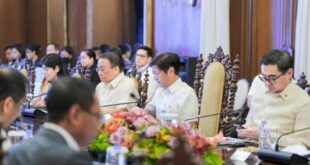
Rey Baniquet and Ver Noveno

The signing of the new agrarian reform act by President Ferdinand Marcos Jr. came full circle on Friday, 50 years after his father, the late President Ferdinand Marcos Sr., signed Presidential Decree 27 in 1972.
Republic Act No. 11953 or the New Agrarian Reform Act signed by the President Friday condones all unpaid amortizations of the principal debt of agrarian reform beneficiaries worth P57.56 billion.
These farmers were tilling a total of 1.17 million hectares of agrarian reform lands.
The New Agrarian Emancipation Act was part of the priority measures the President asked Congress to pass in his first State of the Nation Address last July 25, 2022.
During the press briefing, the President said that he is continuing his father’s previous work, pointing out that it was always his late father’s intention to give land to farmers and farm workers.
Presidential Decree 27 was signed by Mr. Marcos Sr. and the minister of the Department of Agrarian Reform, Conrado Estrella Sr.
Under the decree, the tenant farmer, whether in land classified as landed estate or not, was deemed owner of a portion constituting a family-size farm of five hectares if not irrigated and three hectares if irrigated.
Succeeding administrations passed the Comprehensive Agrarian Reform Law.
The current DAR Secretary, Conrado Estrella III is the grandson of Estrella Sr., who signed the PD 27 with the elder Marcos.
Finance Secretary Benjamin Diokno said Friday that the condoning of the unpaid amortizations of agrarian reform beneficiaries would not hurt government revenue.
At a press briefing after the President signed the New Agrarian Emancipation Act, Diokno said the amount that was condoned was not included in the estimation of the government’s revenues.
“This will have no impact on the fiscal picture of the government because we have planned our deficit target in the next five years, including our revenues. This is not included in the computation,” Diokno said in Filipino.
The newly-signed law, Republic Act No. 11953, will benefit 610,054 agrarian reform beneficiaries as it writes off P57.557 billion of their loans.
Lawmakers commended the President for signing the New Agrarian Emancipation Act which will serve as a catalyst for rural development and would contribute to the overall growth and prosperity of the country.
“The groundbreaking legislation is a testament to President Marcos’ unwavering commitment to the welfare of our farmers and the promotion of agricultural development,” Speaker Ferdinand Martin G. Romualdez said in a statement.
He said Republic Act 11953 would free the agrarian reform beneficiaries from the shackles of indebtedness as the new law aims to condone the debt of agrarian reform beneficiaries tilling 1.173 million hectares of land.
Under the old law, beneficiaries are required to pay for the land awarded to them in annual installments with 6 percent interest for a maximum period of 30 years. The measure condones all the unpaid amortizations of the principal debt, including interests and surcharges.
“By condoning these substantial debts, the act aims to alleviate the burden on our agrarian reform beneficiaries, providing them with a fresh start and a renewed opportunity to enhance their productivity, improve their livelihood, and uplift the quality of their lives,” Romualdez said.
Under the new law, the government will also assume the obligation of 10,201 agrarian reform beneficiaries tilling 11,531 hectares of land to pay the remaining balance of the direct compensation due the concerned landowners under the Voluntary Land Transfer or the Direct Payment Scheme amounting to P206,247,776.
“When our farmers are freed from the burden of debt, they would be able to invest more in their land and improve their productivity. This can lead to better yields and profits, which can help improve the lives of our farmers and their families,” Romualdez said.
Senate President Pro Tempore Loren Legarda said she hopes the New Agrarian Emancipation Act would bring meaningful change and contribute to the welfare of Filipino farmers, paving the way for agriculture-driven economic growth.
Legarda, a co-sponsor and co-author of the New Agrarian Emancipation Act in the Senate, said she believes this measure marks a significant step toward historical and social justice for Filipino farmers.
She acknowledged that while this act might not completely address all their challenges, it is a crucial effort toward mitigating issues concerning land ownership and reducing the burden of loan payments.
“Equipping our farmers with the necessary support and assistance from the government should be the top priority of any administration to strengthen food security and enhance overall economic productivity,” Legarda said in a news release.
Senator Imee Marcos said freeing farmers from debt through the passage of the New Agrarian Emancipation Act was the first concrete step to fulfill the vision of her father, President Ferdinand E. Marcos Sr.
“I am personally gratified that my work in the Senate has allowed me to somehow continue my father’s legacy,” said Marcos.
Shortly after assuming office during the 18th Congress, she filed Senate Bill No. (SBN) 849 entitled “An Act Fulfilling the Emancipation of Tenants from the Bondage of the Soil.”
Please enable JavaScript to view the comments powered by Disqus.
*****
Credit belongs to : www.manilastandard.net
 MaharlikaNews | Canada Leading Online Filipino Newspaper Portal The No. 1 most engaged information website for Filipino – Canadian in Canada. MaharlikaNews.com received almost a quarter a million visitors in 2020.
MaharlikaNews | Canada Leading Online Filipino Newspaper Portal The No. 1 most engaged information website for Filipino – Canadian in Canada. MaharlikaNews.com received almost a quarter a million visitors in 2020.

